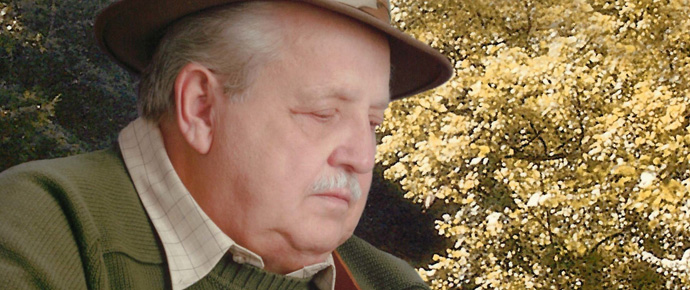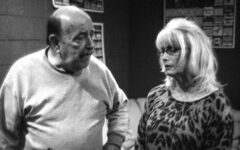
Bluegrass song-writing legend Pete Goble passed away on July 25, 2018. He was suffering from pneumonia and confined to Henry Ford Wyandotte Hospital, Wyandotte, Michigan, when he died at aged 86.
John ‘Pete’ Goble was born on April 24, 1932, and grew up in Prestonsburg, Kentucky, moving to Detroit, Michigan, in 1948. He lived in the state for the rest of his life. Starting from humble beginnings, he worked at Great Lakes Steel, situated along the Detroit River between Lake Erie and Lake St Clair, with whom he stayed until he retired.
In 1996, when 65 years of age, he survived crashing his ultralight plane on US Rt. 23 near his farm on Summerfield Road in Petersburg, Michigan, although not surprisingly he suffered serious injuries.
These led to severe arthritis that got so bad that he could not play guitar in his later years. He had been flying for 28 years.
In 2006 he had to cope with some major surgery.
Pete Goble became hooked on bluegrass music when he heard the Flatt and Scruggs’ Mercury recording, Down the Road.
When he was in his mid-20s he started playing the guitar.
At about that same time — 1957 actually — Goble started writing songs, with his first few being You’ll be a Lost Ball, I’ll Drink No More Wine, and I’ll Never Take No for an Answer.
Other songs that he wrote included Moundsville Pen, When I’m Knee Deep in Bluegrass, Call of the Whippoorwill, Highlander’s Farewell, Born to Be a Drifter, It’s Too Late Now, Thank God for the Highways, Lesson in Love, (Pretty) Roses Remind Me of You, Bad Day in Akron and It’s Amazing What Sunshine Can Do.
Lost & Found’s version of Roses Remind Me of You, released on the Rebel CD Love, Lost and Found (on March 24, 2009), features Allen Mills’ usual strong vocals …..
In 1961, he was introduced to Leroy Drumm in a Detroit bar one night. They began writing together ten years later.
Along with Drumm, Goble penned Georgia Girl, Blue Virginia Blues, Colleen Malone, Tennessee 1949, Dixie in My Eye, Joe’s Last Train, Windy City, Back to Hancock County, Only a Phone Call Away, Many Hills of Time, Julie Anne (Come On Home), Leavin’ You and Mobile Too, You Can Keep Your Nine Pound Hammer, Jubilee Road, Back To Sugar Hill, Willow Creek Dam, She’s Walking Thru My Memory, Thief In The Night, My Kentucky Dream, Old Barstool; and one of Goble’s most requested songs, God Sent An Angel, the writing of which had input from Doyle Lawson as well; and, with Bobby Osborne, Big Spike Hammer, Gonna be Raining When I Die, and I’ll Be Alright Tomorrow, Midnight Angel, Windy City, This Heart of Mine Can Never Say Goodbye, and Son of a Sawmill Man.
Back to Dixie is another collaboration with Doyle Lawson, as is Please Search Your Heart.
These songs, many of which became bluegrass music standards worldwide, have been recorded by the elite of bluegrass performers among whom are the Country Gentlemen, Jimmy Martin, J.D. Crowe & The Kentucky Mountain Boys, the McPeak Brothers, the Shenandoah Cut-Ups, Bill Harrell & The Virginians, Larry Sparks, IIIrd Tyme Out, Alison Krauss, Rhonda Vincent, Dailey & Vincent, Lost & Found, Bluegrass Cardinals, Doyle Lawson & Quicksilver, Hot Rize, the Stoneman Family, Lynn Morris, Claire Lynch, Special Consensus, Paul Williams & the Victory Trio, The Eddie Adcock Band, The Grascals, Traditional Grass, Larry Stephenson, Dale Ann Bradley, Doc Watson, and Mountain Heart.
Country music artists The Browns (Jim Ed, Maxine and Bonnie) and Amber Digby both recorded a song written by Goble; interestingly the same song, This Heart of Mine (Can Never Say Goodbye), from the Osborne Brothers’ repertoire.
Indicative of the strength – in terms of consistent quality, as well as quantity – of Pete Goble’s catalog of songs, recordings spanned a period of five decades, perhaps more. They cover a wide array of topics, love, murder, historical – Billy McGhee and That Fork in The Road, both related to the American Civil War – religious (Gospel), and seafaring; and moods – happy, nostalgic, and sad.
He had his own publishing company, named Brandy Keg Music.
Two of Goble’s songs (both penned with Leroy Drumm), Tennessee 1949 (in 1988) and Colleen Malone (1991), won the IBMA Song of the Year award.
Tennessee 1949 is one of the best nostalgic songs, of which there are many, in the bluegrass music canon ….
Goble was named SPBGMA Song Writer of the Year Award in 1997.
He was presented an IBMA Distinguished Achievement Award in 2002.
Goble’s considerable contributions to bluegrass music were recognised by the South-East Michigan Bluegrass Music Association with his induction into their Hall of Honor in 2017.
Tim O’Brien won a Grammy in 2006 for Traditional Folk Album Fiddler’s Green. The title track was co-written by Goble and Drumm.
The Goble-Drumm song-writing partnership lasted until 2010, when Drumm passed away.
While Goble is best known for his song-writing, in the early 1960s he recorded with Billy Gill and The Kentucky Rebels, with four sides being released on the Wayne, Michigan, Happy Hearts label.
Also, for a brief period in his later years he had his own band, Jubilee Road.
Ray Legere values his deep friendship with the Gobles …
“I will miss his calls saying, Good Buddy.’ Pete and his wife Beulah invited me to their house anytime, and on one occasion sang me some of his songs that were not yet recorded. It certainly wore him out but, I appreciated the extra effort it took and it means the world to me.
It is so cool hearing a band doing a great song and finding out the song came from the pen of Mr. Goble. He was a master songwriter and even better friend. I was honored to play on his CD of originals knowing there were so many great fiddlers at his beck and call.
I’ll miss you my friend but I’m happy knowing your songs will spark memories of my time spent with you and Beulah.”
Larry Sparks recalls how he heard a couple of Pete Goble songs for the first time …
“I’d known Pete for 40 plus years. He was a nice guy to be around and a great song writer. Pete came to my home in Kentucky and we sat at my kitchen table. He pitched a couple songs to me and sung them to me. I recorded them and they became bluegrass hits for me; Blue Virginia Blues and Tennessee 1949. Sad that we have lost another great supporter in our music.”
Bill Emerson is another who had a long and abiding friendship with Goble ….
“I met Pete Goble at a bluegrass festival in Michigan in 1971. He was sitting at a picnic table singing and playing guitar with a large crowd gathered around him. I went over to listen and was impressed not only with his songs, but also with his singing and guitar playing. I told him I’d love to record an album with him and eventually we did. Many of Pete’s songs climbed high into the charts and Tennessee 1949 became a number one hit. There won’t be another like him.”
R.I.P., Pete Goble
A Discography:
Pete Goble –
- When I’m Knee Deep in Bluegrass (Fire Heart FHP 7349, 2005)
Pete Goble and Bill Emerson –
- Tennessee 1949 (Webco WLPS-0123, 1986)
- Dixie In My Eye (Webco WLPS/WRCD-0128, 1989)
- Webco Classics, Vol. 1 (Webco WCD-6001, 1995)
Pete Goble and Andy Ball –
- Back to Jubilee Road (Moon Ridge Records, 2012)
Pete Goble & Billy Gill with The Kentucky Rebels –
- Save Me All the Heartaches / Cherokee (Happy Hearts 120, 1961)
- Down Where the River Bends / Columbus (Happy Hearts 122, 1962)







